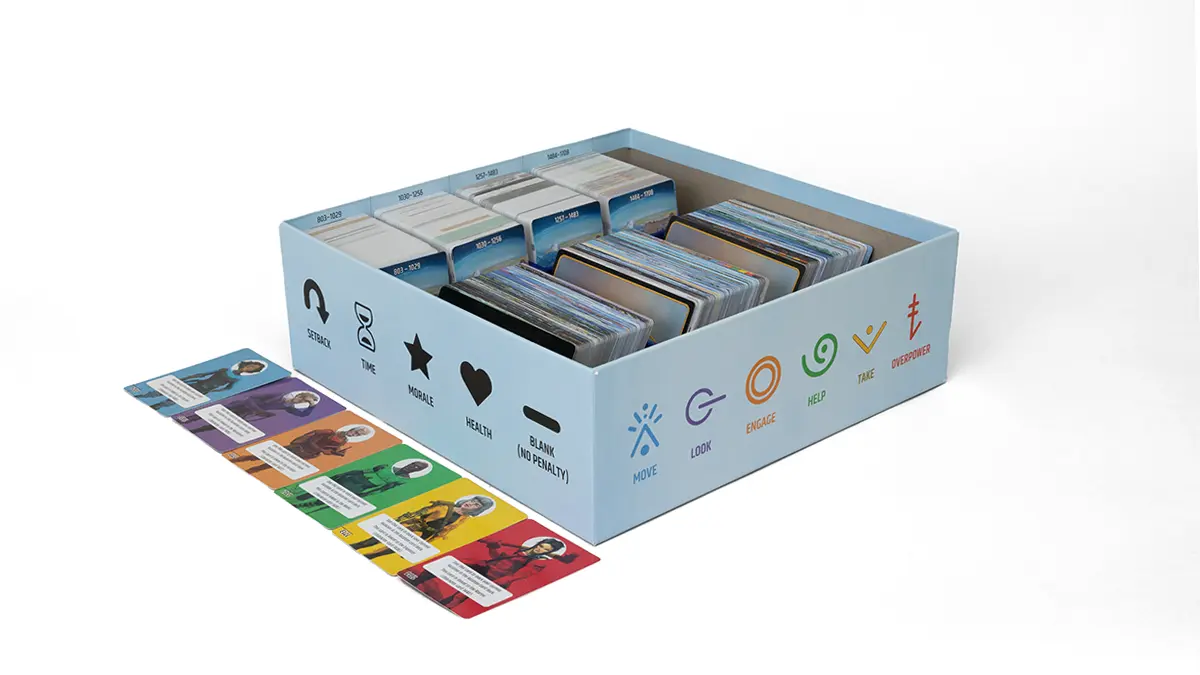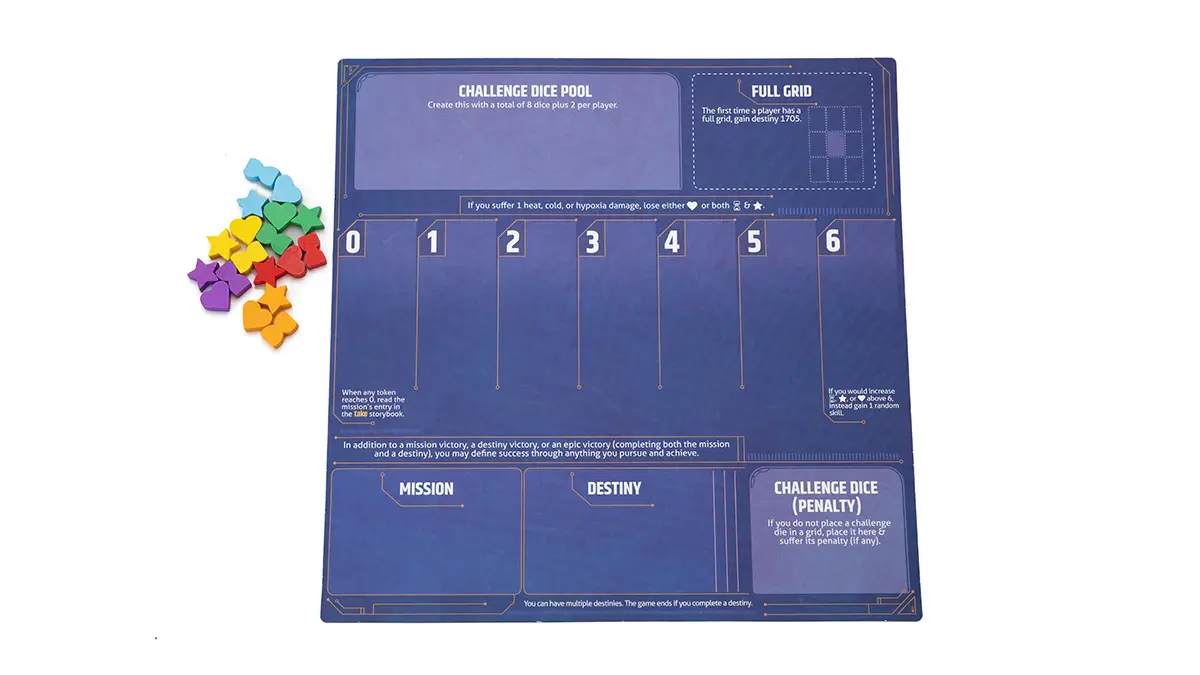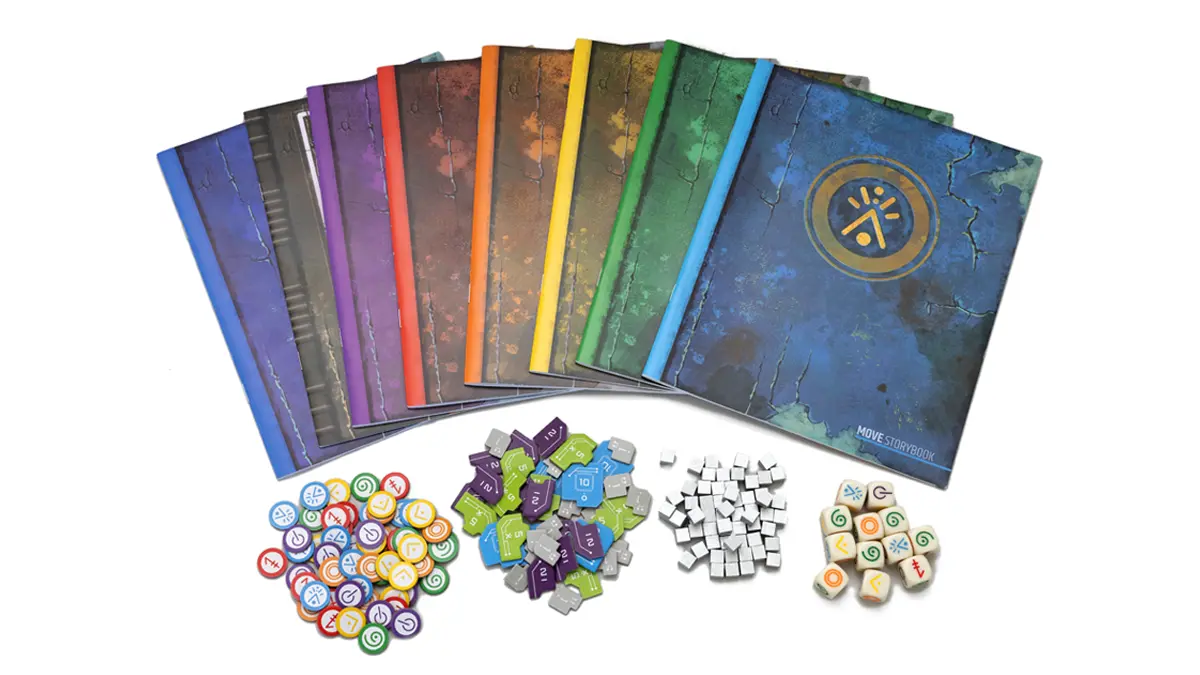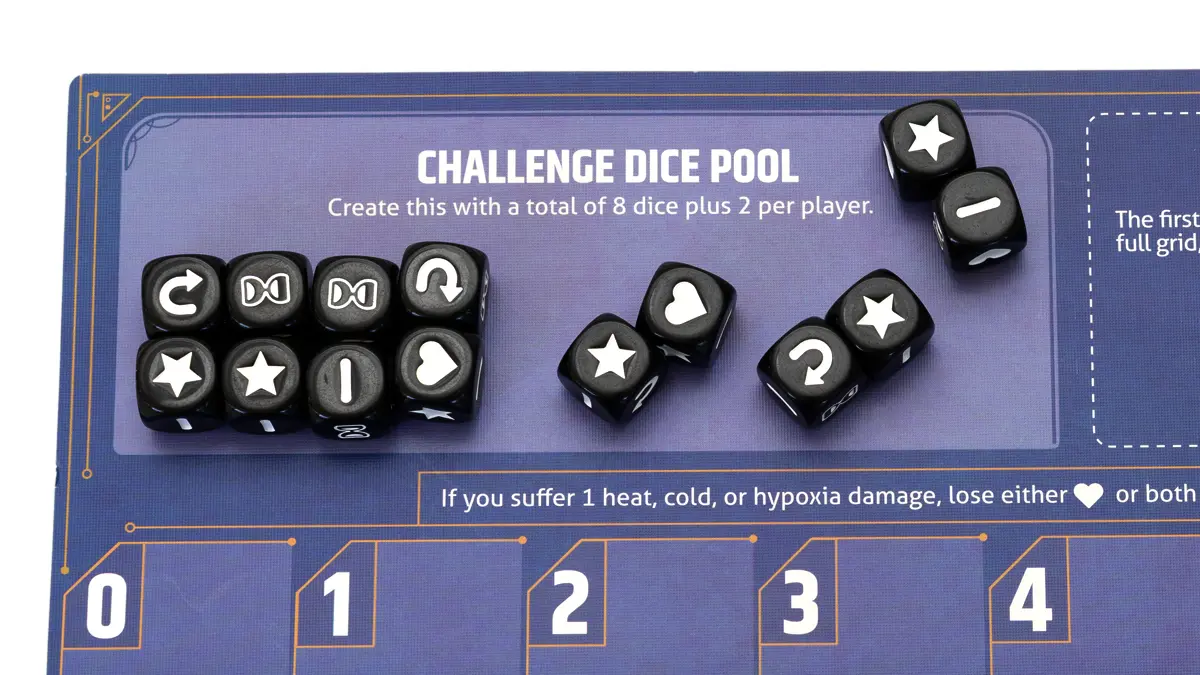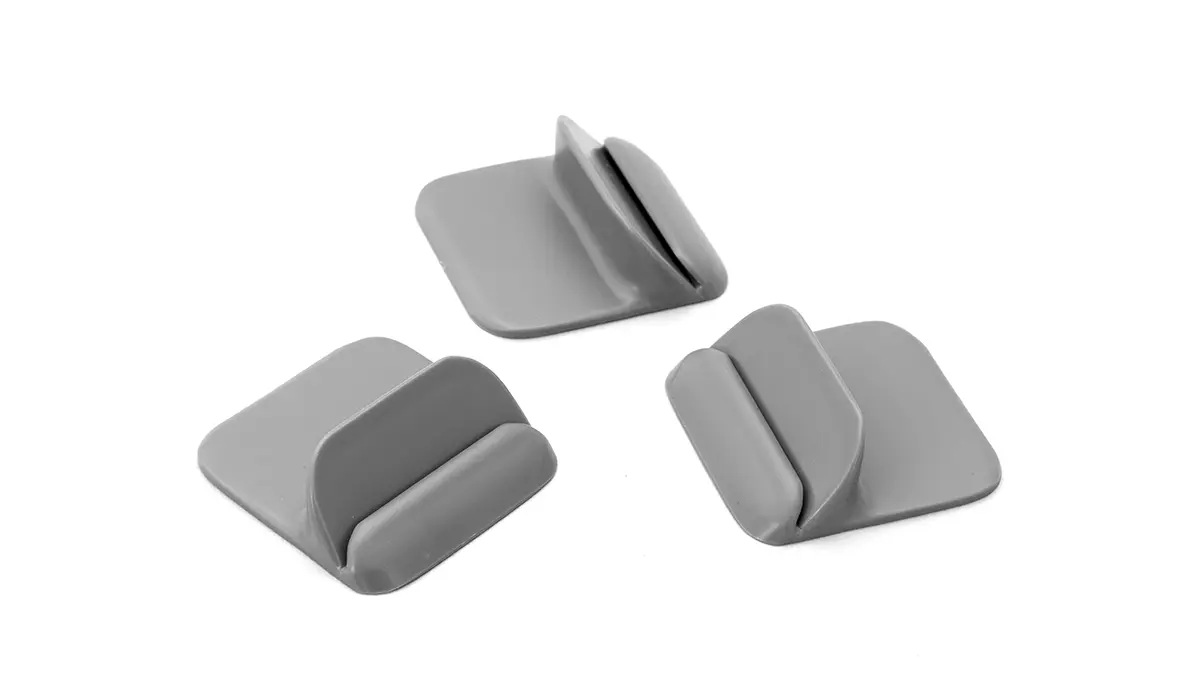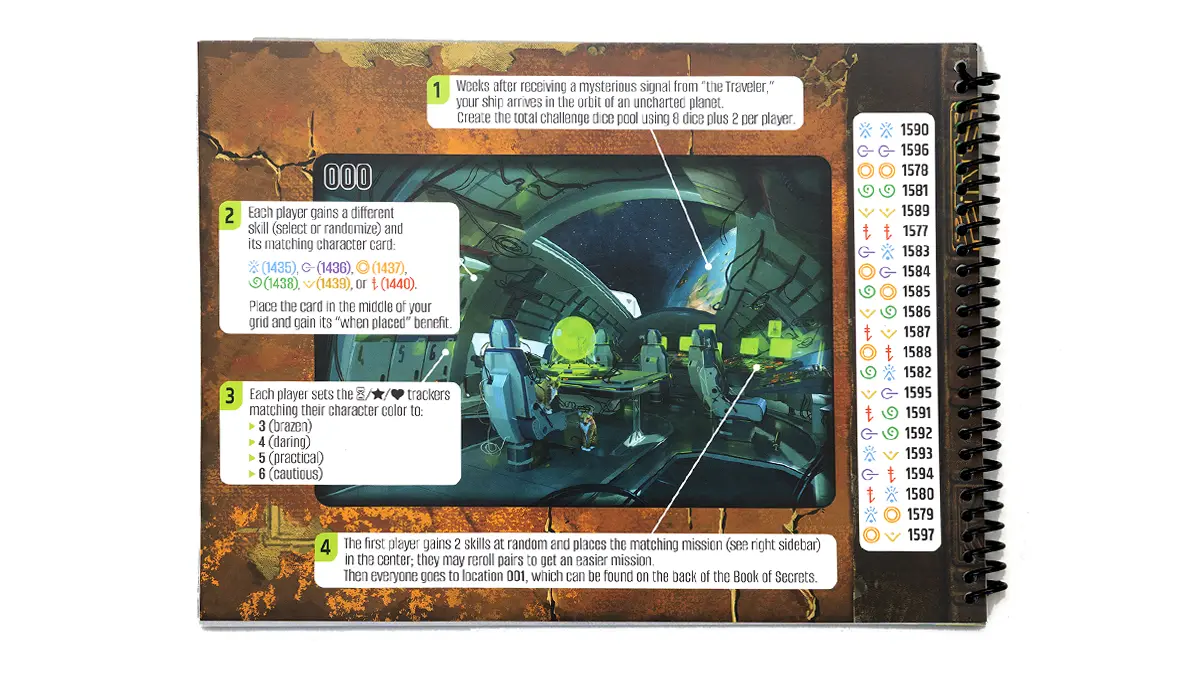001
The ship malfunctions! You have mere seconds to escape.
Each player gains a different skill (select or randomize) and places the matching location in their location card holder:
-
002
-
003
-
004
-
005
-
006
-
007
After players simultaneously follow the instructions on their unique escape pod, each player should have 4 skill tokens (1 from step 2 on location 000, 1 from location 001, and 2 from their escape pod); the first player should have 2 extra skill tokens from choosing the mission. Each player should also have 2 boost on their character.
What’s this about?
This site is an official rules reference for Vantage by Stonemaier Games.
It’s great for finding a specific rule quickly. It’s also an excellent supplement to the rulebook included in the box, when watching a how-to-play video, or while teaching the game.
Usage Tips
Back & Forward Nav: Think of each rule entry as a separate webpage. If you want to jump back, hit your Back button.
Check the Index : Don’t see what you’re looking for? The Index has every term in the game. Warning: includes spoilers.
Install it: This site is a (Progressive Web App). You can install it as a standalone app that is lightning fast, and works even when you’re offline.
Link to a rule: Want to share a link to a particular rule? Just click its title!
Credits
Designed by: Jamey Stegmaier
Art by: Valentina Filić, Sören Meding, and Emilien Rotival
Special Thanks
Vantage has been a passion project for me (Jamey) for over 8 years, but I was not alone in this endeavor. In addition to the monumental effort of creating an entire planet through nearly 1700 illustrations by Valentina Filić, Sören Meding, and Emilien Rotival, I am forever grateful to Juliana Moreno and Ariel Rubin (The Wild Optimists) for creating some of the in-game puzzles, Ira Fay for creating the playtest app from scratch, Shannon Lentz at Panda Game Manufacturing for years of discussions about components, Jose Manuel López-Cepero for creating the web app, Karel Titeca and Christine Santana for typesetting and graphic design, Morten Monrad Pedersen and the Automa Factory team for their help with the solo rules for the spoiler pack, developers Garrett Feiner and Travis Willse for their detailed feedback and editing, and Ryan Davis and Travis Willse for adding extra flair to many of the Move and Depart storybook results.
Playtesters: Mike Bartoo-Abud, Mitch Caudill, Blake Chursinoff, Caleb Chursinoff, Dusty Craine, Ryan S. Davis, Susannah Eisenbraun, Mark Espiridion, Ira Fay, Allie Feiner, Garrett Feiner, William Augustus Griffin Sr., Lindsay Grossmann, Ossian Hawkes, Wanja Heeren, Preston Holmes, Chris Ingold, Josh Jahner, Ben Jepsen, Abigail Jones, Emily Jones, Derik Kellner, Robert Konigsberg, Max Lüdov, Tyler McKinnon, Thom Mollinga, Chris Munford, Jay Nabedian, Crystal Nevin, Jason Nevin, Nicolas Pupat, Gregory Rempe, Caroline Rempe, Clara Rempe, Dominick Salazar, Ana Salazar, Erica Sanders, Artur Carvalho Santos, Nathan Smith, Franziska Steiner, David Studley, Lieve Teugels, Karel Titeca, Kobe Titeca, Michael Vannoy, Josh Ward, Travis Willse, Shawn Wilson, Darren Wolford, Frank Wolf, Kentoku Yamamoto
Proofreaders: Brian Chandler, Garrett Feiner, Jan Horák, Jared Kepron, Mike Lee, Crystal Nevin, Justin Radziewicz, Asa Swain, Karel Titeca, Ian Tyrrell, Jay Voss, Josh Ward, Travis Willse, Dana Woller, Dave Zokvic
I’m also incredibly grateful for the many amazing games that inspired Vantage in some way, including The Legend of Zelda: Breath of the Wild (and Tears of the Kingdom), The Witcher 3, Baldur’s Gate 3, Eastshade, Stardew Valley, Subnautica, Red Dead Redemption, Ghost of Tsushima, Elden Ring, Tunic, TIME Stories, The 7th Continent (and Citadel), Sleeping Gods, Tainted Grail, Earthborne Rangers, Near and Far, Crusoe Crew, Lands of Galzyr, Micro Macro, One Deck Dungeon, and Roll Player Adventures, among others.
Changelog
- 15 Jul 2025
-
Addition of FAQ, Errata, and Resources.
- 16 Jul 2025
-
Updates from rulebook version r20. Updated errata.
- 17 Jul 2025
-
Added to card grid section: “You may not place challenge dice on horizontal cards in your supply.”
- 21 Jul 2025
-
Updated Errata and FAQ. Incorporated content from the Book of Secrets glossary.
- 23 Jul 2025
-
Added storybook lookup feature, including updates to storybook content.
- 24 Jul 2025
-
Added disclosure widgets to storybook entries to hide decision results.
- 25 Jul 2025
-
Updated Errata. Fixed access to single-digit storybook entries.
- 28 Jul 2025
-
Updated Errata. Enabled wake lock setting. Added links in some storybook entries.
- 2 Aug 2025
-
Updated text in some storybook entries, and fixed two small typos.
- 7 Aug 2025
-
Updated text in some storybook entries, and some minor content styling fixes.
- 9 Aug 2025
-
Updated Errata.
- 17 Aug 2025
-
Updated glossary entry for cities. Fixed hyphenation issues in storybook entries.
- 26 Aug 2025
-
Errata for depart 213. Additional rule clarifications. Minor wording changes to some storybook entries.
- 29 Aug 2025
-
Updated Errata. Minor storybook entry formatting and phrasing fixes.
- 11 Sep 2025
-
Updated Errata. Minor storybook entry formatting and phrasing fixes.
- 20 Sep 2025
-
Storybook entry corrections and clarifications.
- 13 Oct 2025
-
Updated Errata. Storybook entry corrections and clarifications.
- 26 Oct 2025
-
Small story entry formatting and phrasing fixes.
- 10 Dec 2025
-
Added location 001 from the Book of Secrets to the Storybook Lookup, plus some minor storybook phrasing fixes.
- 26 Dec 2025
-
Updated Errata to align with Stonemaier's website.
- Last checked
Abilities
Ability cards provide you and other players with challenge dice slots for specific actions. For example, you might learn how to swim, and you can coach your fellow players if they need to swim as well (hence the impact slots).
-
Some actions on ability cards mention “nearby” natural features, indicating that they can be used only if those features are visible and easily accessible on your location.
-
Some actions on abilities allow you to gain the benefit of a matching action (i.e., on a location, which counts as a completed location action).
Actions
Turn step 1: Choose one action from the three types of actions
You choose without knowing the cost or outcome, but you always succeed. The challenge is avoiding loss of time (), morale (), or health ().
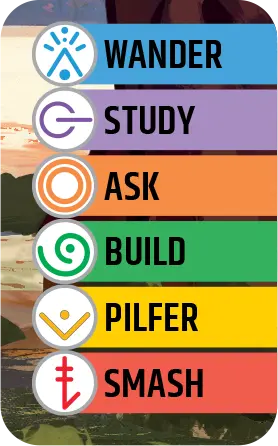
Each location lists (usually 6) location actions in the categories of move , look , engage , help , take , and overpower .
Reference the storybook entry for this location (e.g., for the look-STUDY action on location 272, reference entry 272 in the look storybook).
-
If you previously performed a location action here (even in a turn some time before the last), you cannot perform another. Choose a depart action or card action instead.
-
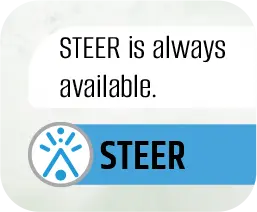
“Always available”: Some location action lists may have a note indicating that a specific action is always available. This action is available even if you previously performed it or another location action here.
-
If another player previously visited the same location this game, you may not perform a thematically contradictory location action (e.g., if a player previously burned a bridge at your location, you may not cross the bridge). Because Vantage is a highly visual single-session game, players should be able to remember where they’ve been or what they’ve done (taking notes is permitted if necessary, though).
Many non-location cards include action options. These include actions on cards in your grid, your supply, and the center.

-
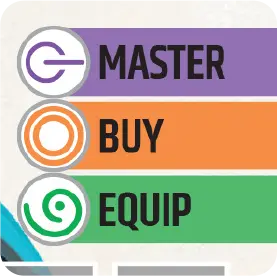
Reference the storybook entry for that specific card (e.g., for a help-EQUIP action on card 1435, reference entry 1435 in the help storybook).
You may not look at the card you are gaining (if any) until you have completed the action.
Unless stated otherwise, you may perform a card action even if you have already performed an action on that card.
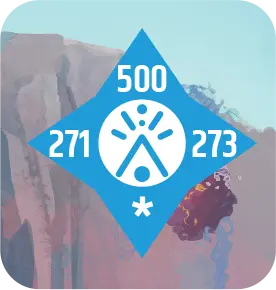
Move away from your location in 1 of 4 cardinal directions to another location (north always points forward). This is a move action.
Each number (500, 273, and 271 for this location) is an adjacent listed location. You may go to any of these locations using a 1-cost move action (WALK or SWIM) that does not use a storybook.
Each star (*) requires you to reference the Depart storybook. For this location, you would look at the “move south” entry for location 272 in the Depart storybook for the cost, action, and result of moving south from this location.
In the rare case that a direction shows neither a location number nor *, you cannot depart from this location in that direction.
Animals
Vantage includes a vast variety of animals (biological creatures that are differentiated from the people-like sentients of the world).
Book of Secrets & Glossary
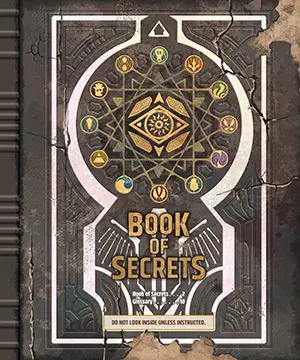
Only reference entries in the Book of Secrets when instructed by a card or action result. It contains solutions to puzzles and resolutions to goals.
Book of Vantages
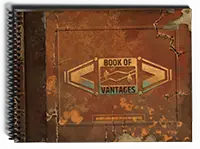
Only reference the Book of Vantages when instructed by a card or action result; if you do, you may describe what you see to other players, but may not show them directly.
Boost
At any time on any turn (even in the middle of an action or while another player is performing an action), you may use boost powers on cards in your grid to benefit yourself. Boost represents knowledge learned while you explore the planet and use the things you discover.
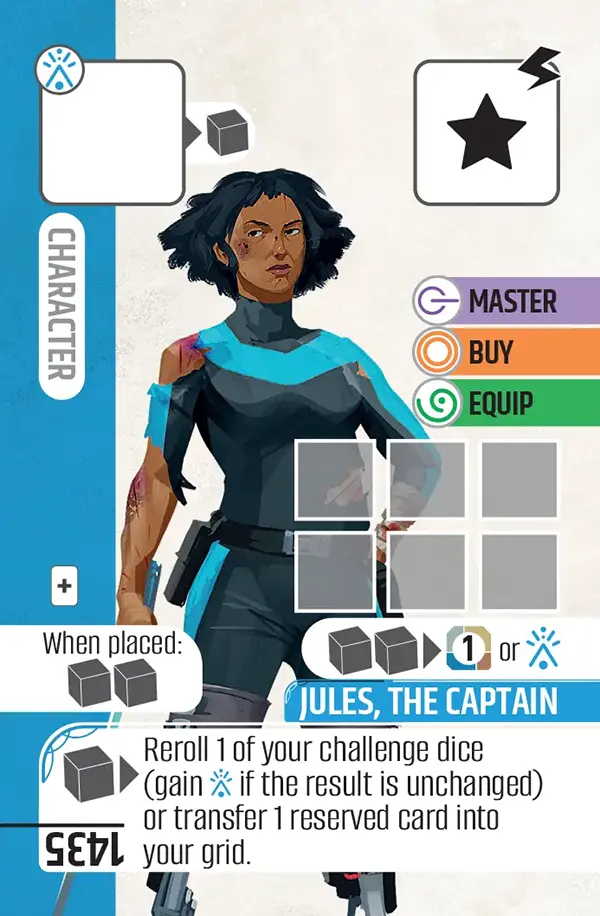
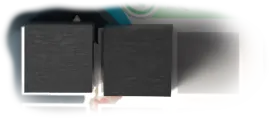
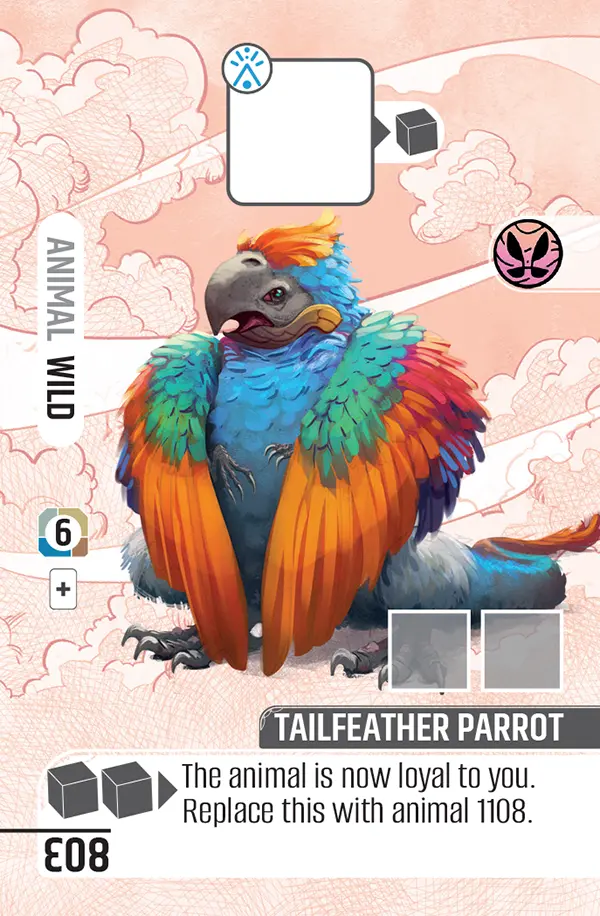
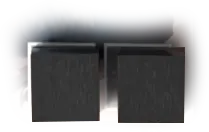
Boost gained/paid on locations goes to/from your character (e.g., if the storybook text of a location action says to “Gain 1 boost,” place it on your character).
Boost gained/paid on all other cards goes on/from that card.
Each card has limited capacity for boost that cannot be exceeded.
The effects of boost powers last until the end of the current turn.
When an icon is used instead of the word “boost,” the number of icons represent the amount of boost. is 1 boost, is 2 boost.
There is no hard limit on total boost tokens in Vantage. In the rare case that all 60 boost tokens are on cards and you need more, any cube is a suitable addition.
If a challenge dice ability says “place them in the center,” it’s referring to the penalty section of the center (otherwise it would say to “refresh” the dice, which returns them to the challenge dice pool).
Some cards request that players place ubiquitous “tokens” to track progress; boost tokens are used for this purpose.
Your boost powers benefit you. If a boost power has an impact icon, it can benefit any player.
Cards

- Challenge dice slot (move) one of your challenge dice can be placed here (for a move action); gain 1 boost after placing a die here
- Some cards have a coin value () the game will tell you when this matters
- Reserve capacity quantity of vertical cards you can keep beyond your grid (1 extra)
- “When Placed” benefit gain when placing this card into your grid for the first time (2 boost); if this benefit looks at other cards, only consider cards in your grid
- Card number
- Challenge dice slot as an impact slot , a challenge die morale result rolled by any player can be placed here
- Card actions when you perform one, refer to the storybook entry for this card (1435)
- Boost capacity quantity of boost this card can hold (6)
- Boost power at any time, pay 2 boost from this card to gain either 1 coin or 1 move skill token
- Boost power at any time, pay 1 boost from this card to do this
The Center (gameboard)
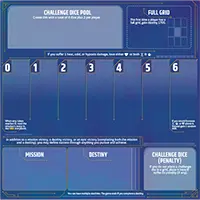
Challenge Dice
Turn step 4: Roll dice from the challenge dice pool equal to the remaining cost
The cost of an action represents its difficulty; roll challenge dice from the pool equal to the numerical cost (e.g., for a cost of 2, roll 2 challenge dice).
-

For example, if the cost is and a player paid 1 look skill token, roll 2 challenge dice instead of 3. If the cost was decreased to 0 by spending skill tokens, do not roll any challenge dice.
If (and only if) there are fewer available dice in the challenge dice pool than the remaining cost, first refresh ALL challenge dice from cards in grids and the penalty section of the center by returning them to the challenge dice pool. For example, if the remaining cost is 2 but there is only 1 die in the challenge dice pool, first refresh all challenge dice, then roll 2 of them from the full pool.
The total quantity of challenge dice in the game is always 8 dice plus 2 per player (any excess dice are not used—keep them in the box).
Characters
Each player always has a character card in the center of their grid. You are that character; you view the world through their eyes. While each character is unique, if you are looking to increase asymmetry among characters, try performing some of the actions printed on your character.
Starting
Starting characters have a when-placed benefit of gaining 2 boost (representing your knowledge), along with capacity for 6 total boost. This is important because the default place to gain boost from location actions and depart actions is on your character. Starting characters have the following abilities:
- pay 2 boost to gain or a move skill
- pay 1 boost to reroll a challenge die you rolled for an action and receive a specific skill if the result is unchanged
- pay 1 boost to transfer 1 card from your reserve to your grid (your character includes a capacity for 1 reserved card, and some other cards increase your capacity)
Characters also have a few actions; use the storybook entry matching the character card’s number if you perform any of these actions as your turn.
Survivor
Coins
You will discover a variety of ways to earn and spend coins (noted as on cards and $1 in storybook text). Many cards also have coin values; action results will indicate when you can sell items for their value. Unless you are at the same location as another player, you may not transfer coins between players.
Components
Component Inventory
- 415 large cards (double-sided; 80x120mm)
- 916 standard cards (57x87mm)
- 1 spoiler pack of cards
- 8 storybooks (including Book of Secrets)
- 1 Book of Vantages
- 1 game board (the Center)
- 20 challenge dice
- 12 skill dice
- 60 boost tokens (cubes)
- 60 skill tokens
- 45 coins
- 6 time trackers (1 per player)
- 6 morale trackers (1 per player)
- 6 health trackers (1 per player)
- 6 location card holders (1 per player)
Composition
Some actions and abilities refer to a card’s “composition,” which is the primary element associated with that card. These icons are also found on some challenge dice slots. Not all cards have a composition, but if they do, it appears as one of these icons:
-

Circuit
-

Energy
-
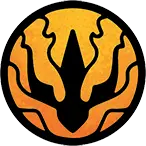
Fire
-

Gold
-

Leaf
-

Metal
-

Sand
-

Sinew
-

Stone
-

Water
-

Wind
-

Wood
Cost and Action
Turn step 2: Read the cost and action (not the result)
The cost and/or action are printed on some cards, though most require players to reference a storybook. In most cases you will use a storybook entry to see the cost and full action. Use the storybook matching the category (e.g., engage) and the entry matching the card on which the action appears (e.g., location 272).

-
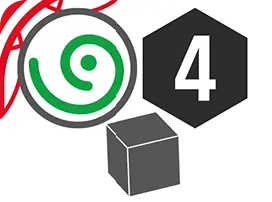
Some cards include the full cost, action, and result—do not reference the storybook for these actions. In addition to the type of action and the standard cost (the quantity of challenge dice to roll), some actions on grid cards also have a boost cost (; a cube paid from that card). In the example to the right, this is a 4-cost help action that requires you to also pay 1 boost.
-
If the depart action you chose is to an adjacent listed location, the move cost is 1. Other adjacent locations are marked with *; you must look up their move cost in the Depart storybook after declaring a direction.
Intercardinal directions: If you move in a specific cardinal direction (e.g., move east) and there is a related intercardinal direction entry in the Depart storybook (e.g., move southeast), you may choose to move in that related direction instead of your original choice.
Regions: Some location actions refer to the region (a broader area encompassing multiple locations), which is a letter noted in parentheses in the look storybook entry for your location.
For actions with cost , choose a number 1–6 as the cost. This indicates how much effort you will put into the action, and the result of the action will depend on the cost number you choose.
Continue
Turn step 8: End your turn.
If a location action’s result includes instructions to “continue”, you must perform an additional action, ignoring the restriction in step 1 (e.g., if you already performed the engage location action, you may choose another location action, but not the same engage action).
Some results include instructions to continue with a specific action. If it is an action noted on the location, start with step 2. Otherwise, start with step 1.
Some non-location actions include instructions to “continue,” but these do not ignore the restriction in step 1.
The instructions sometimes read, “You may continue”; in that case, continuing to perform another action is a choice, not mandatory. This only applies to your current turn; you may not continue at this location on a future turn unless another action allows you to do so.
Curses
When caught doing something devious by a nearby sentient (sometimes out of view on an adjacent location), it is possible you will gain a curse card. If so, you must place it in your grid. If your grid is full, you may not reserve the curse. Instead, reserve a non-character card to make room.
Each curse adds a penalty to unplaced setback challenge dice results () when any player interacts with an action on a location or other card with the corresponding composition icon. Setback results are not equivalent to time, morale, and health results on challenge dice for the purposes of placing setback dice on grid card slots, even when the penalty for not placing a specific setback result is to lose time, morale, or health.
Damage
If you suffer 1 heat, cold, or hypoxia damage, lose either 1 health , or both 1 time and 1 morale .
Difficulty
Vantage presents players with a variety of options to scale how difficult it is to win, most of them during setup. Feel free to experiment with these to see what fits best for you.
The starting position of your time, morale, and health trackers. If you’re feeling bold, you might set them all to 3 or 4; for a little buffer, you may choose 5 or 6 instead (the track maxes out at 6). Just like the game Nations, each player chooses independently, taking into account that a riskier player may need extra help from others during the game. You can even choose these starting stats based on how long you want the game to be—we found that some players want their first game to end quickly so they don’t see too much while learning the mechanisms, while others prefer a more relaxed experience.
The type of mission. The mission is randomly selected by rolling 2 skill dice. Mathematically, rolling a specific pair of runes occurs less often than rolling a specific non-pair, so the 6 mission cards associated with pairs are the most difficult missions. As indicated on location 000, you can reroll pairs to get an easier mission.
The crash location. In each escape pod, there are 21 possible locations where you can crash (126 total across all 6 escape pods). The top 6—the pairs—are in more extreme climates, so you can reroll them for an easier start.
The inclusion of actions on each mission card that assist your progress. These actions were added during the playtest process to help players who struggled with some of the missions. The game does not hold your hand, and many missions have multiple ways to accomplish them (plus, you may simply decide you don’t care about the mission). But if you decide the mission is important to you and yet you’re struggling with it, each mission includes 4 actions that will help.
Challenge dice (optional variant): The first time a player has 3 cards and 6 cards in their grid, permanently add an extra die to the challenge dice pool. This isn’t possible at 6 players; for 1–5 players this will result in a total of 2 challenge dice added to the pool.
Elementals
Elementals are ancient monsters that sprang to life when the planet was first seeded with the 12 elements.
Elemental locations: The first time each game that you arrive at an elemental location, you will incur an immediate penalty and be forced to go to an adjacent location. This is essentially a warning shot from the elemental.
Elemental cards: If you gain an elemental by releasing it, it instructs you to transfer 3 boost from adjacent cards onto the elemental (they absorb the power of surrounding cards); you choose which boost to transfer if there are more than 3 boost on cards sharing an edge with the elemental. Each elemental has a few challenge dice slots that cost boost (from the elemental) to use. If an elemental has no boost on it, lose the card and gain the listed benefits (1 time/morale/health and 1 specific skill).
Slaying an elemental: Slaying a monstrous elemental is a difficult task that requires multiple actions to complete. If you choose the overpower-SLAY action, you will be instructed to find 4 cards to combine on the table to form the elemental. You can then choose which of those cards (a different part of the monster) to slay first, with different parts resulting in different benefits to aid you in the SLAY actions. You can also choose to retreat, ending the attempt to SLAY the elemental. Actions on elemental combat cards count as interactions with that elemental (for any added penalties from the associated curse card).
End of Game
A game can end in several different ways, and the storybooks will give you the option (or the requirement) to end the game when:
-
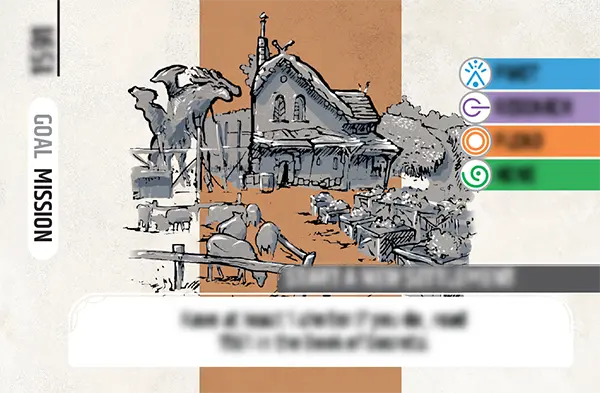
You complete the mission (completing a mission will give you a choice between ending the game and continuing to pursue a destiny).
-
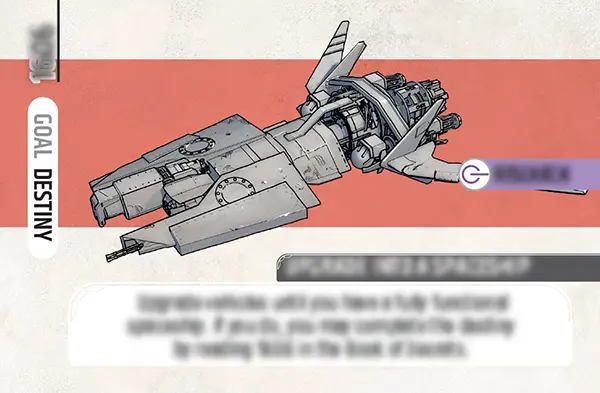
You complete a destiny (and then choose to read its storybook entry, which will end the game). You may collect multiple destiny cards.
Any player’s time, morale, or health is reduced to 0. If this happens, read the mission’s entry in the take storybook.
You may even end the game when the time you allotted to play Vantage has expired. There is a lot of variation in the duration of Vantage depending both on random factors and player choices (e.g., performing the actions printed on the mission can significantly decrease the duration). Some games may end far quicker than 2 hours, while others might push beyond the 3-hour mark.
In addition to a mission victory, a destiny victory, or an epic victory (both the mission and a destiny are complete), you may define success through anything you pursue and achieve.
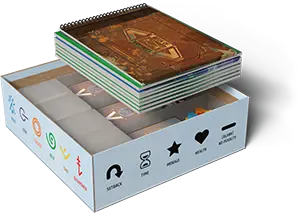
When the game ends, return all cards and components to the box (any cards gained from the spoiler pack return to that pack). In other words, everything completely resets so you can have a new adventure the next time you play Vantage. For storage purposes, lay the 3 stacks of location cards flat inside their compartments with various tokens/dice in the gaps that remain, then place all storybooks on top of them.
Errata & Clarifications
- 104
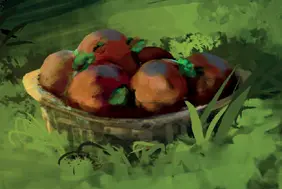 A relevant portion of the illustration is obscured by the card text — a basket containing 6 fruits.
A relevant portion of the illustration is obscured by the card text — a basket containing 6 fruits.- 267
- The card composition should be wind
 , not leaf
, not leaf  .
. - 431
- Change “Then go to 413, 723, or 728” to “Then go to 476.”
- 874
- Replace “(reserve this)” with “(replace this)”. 10 Oct 2025
- 910, 911, 912, 913, & 932
- 3 boost slots are missing from these fishing gear cards (you can gain boost on these cards by performing their FISH action and getting a specific result).
- 948
- Increase the cost of the boost power to 2 boost (instead of 1). 10 Oct 2025
- 957
- The dice slot is missing a boost output . When you place a challenge die on this slot, immediately gain a boost token on that card.
- 962
- The dice slot is missing a boost output . When you place a challenge die on this slot, immediately gain a boost token on that card.
- 1013
- RIDE should be a boost power, not a card action.
- 1016
- 3 boost slots are missing from this vehicle card (you can gain boost on this card by performing its FISH action and getting a specific result).
- 1092
- The craft action directs you to the correct card (881), but it’s listed as “Steelclamp” instead of “Crabgrip”. In any case where the name doesn’t match the number on a card like this, the number is correct.
- 1444 & 1450
- The second boost ability should be “refresh 1 challenge die on another card”
Note: The errata below has been incorporated into the storybook lookup.
- move 051–063
- To make this action a little friendlier, instead of losing vehicles when you DIVE, we have revised the text to read, “Reserve all vehicle cards (if any) while you’re underwater.”
- look 145 & 301
- The ability you gain should be 1483 (not 1482).
- look 303
- Change the entire result to “As you trace the lines on the stone, three distinctly colored icons emerge. You may choose to focus on one of the three. If you choose the green icon, gain spell 1236. If you choose the pink icon, gain spell 1237. If you choose the blue icon, gain spell 1238.”
- look 439
- Change “more than 1 die” to “1 or more dice”.
- engage 579
- In the first bullet point, 410 should be 499.
- engage 1435–1452
- Change to “A traveling merchant offers you the opportunity to buy a special product to support one of the six actions. You may first sell at most 1 card (from your grid or reserve) to gain its coin value, then choose one or gain 1 boost:”
- help 020–021, 023–026, 028, 030–039, 050
- help-SHARE actions should have “You may continue” after the action (these are places where you’re trying move past a specific type of barrier).
- take 123
- This should give you card 1472, not 1480.
- take 781
- The first option should give you card 1336, not 1344.
- overpower 024, 036, & 039
- The BURN action on cavern barriers should have “You may continue with a look-EXPLORE action.”
- overpower 530
- The opponent’s card should not be 1530; it should be 1521.
- overpower 558
- This should have you exit to 271, not 215.
- overpower 910, 911, 912, 913, 932, & 1016
- The entries for these fishing-related items should include the line “roll 1 extra die per boost you pay from this”.
- depart 213 (north)
- This should take you to 218, not 210.
There is currently no official errata, but updates and clarifications to the rulebook are incorporated into this reference as they become available.
Escape Pods
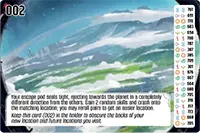
The view from each escape pod is unique, as they head towards 1 of 6 different regions of the planet. Each escape pod can crash on 21 locations (126 total locations)—you might crash close to another player, but you will never crash on the exact same location. You may not perform actions on other cards while in an escape pod.
Experience
Each character has a specific experience card that you may use to mitigate challenge dice results and even gain health. However, if there are 3 boost on your experience card (it is “full”), at the end of your turn you must lose the card (it cannot be regained) and you may replace your character with an alternative card (generally this is a good idea, but if you already have an alternate version of your character, you may prefer not to replace it). When this happens, any challenge dice on the experience and character cards are refreshed to the challenge dice pool. Any boost on your current character card are transferred to the new card.
Frequently Asked Questions
If the game ends due to a player’s time, morale, or health dropping to 0, do you complete the current action? Can you “rally to take one final chance” more than once per game?
If a player’s time, morale, or health drops to 0 (typically during step 6 of an action, which is before any benefits are gained), you immediately read the entry in the TAKE storybook for the mission, which includes an option to potentially proceed. If you do, you’ll be instructed to “continue playing,” at which point you finish whatever you were doing before (including gaining the benefit of the current action). The intent of “one final chance” is that final is final–once per game–but it’s intentionally worded with a little ambiguity so that players can end the game or proceed on their own terms. This is your journey, not ours!
How do you get more skill tokens?
Skill tokens are primarily there at the beginning of the game when you don’t have many ways to mitigate dice. However, there are many actions in the game that give you a specific skill token (e.g., “gain 1 move”) or a random skill token (roll a skill die). Some of these actions are very consistent–you just need to try a variety of actions and communicate about what you find. There are even a few way built right into the starting components: As noted on the board, if you have 6 time/health/morale and you would gain more, you gain a random skill instead; as shown on your starting character, you can pay 2 boost to gain 1 move skill token or gain a skill if you reroll and roll the same result.
Two blue storybooks
There are two different blue storybooks, one for Move actions and one for Depart actions.
Skill tokens
The primary function of skill tokens is to decrease the cost of an action (typically early in the game), but skill tokens are never needed to perform any action.
“Place them in the center”
If a challenge dice ability says “place them in the center”, it’s referring to the penalty section of the center (otherwise it would say to “refresh” the dice, which returns them to the challenge dice pool).
Card actions
There are a variety of “card actions” you can perform on cards in your grid, in your supply, and on your mission. These are either listed on the right side of the card (use a storybook to find the cost and result) or at the bottom of the card (which shows the type of skill, cost, and result). When performing card actions, follow all action steps as normal.
No dice on horizontal cards
You may only place challenge dice on cards in your grid (not in your reserve or supply).
Challenge dice slots with words in them
Like the example shown here, you can place challenge dice on these slots while performing the matching action (e.g., while performing a help-CREATE action, you can place a die on a slot that has the word “create” in it). Some of these slots have multiple words to use while performing any of those actions.
Cities
City locations are labeled with the name of the city (or town, village, etc–they’re all cities). Cities offer an exception to the typical rule of one total location action per location. “You may perform multiple different actions here (1/turn).” Please note the word “different”—you may not choose the same action twice.
Location Action Restrictions vs. Card and Depart Actions
For each location, you may perform at most 1 location action (unless a location action there says to “continue”). This restriction does not apply to card and depart actions. For example, your character card has multiple actions (master, buy, equip); on separate turns you may perform any of them, or even repeat the same action (unless it specifically says you can only perform it once).
What’s a “faction emblem”?
This is one of the many different types of cards you can find in Vantage. It’s listed in the glossary under items as “emblems”. You’ll know when you’ve earned one of these emblems because it will have the word “emblem” in multiple places on the card.
Do some puzzles have more than one solution?
Are there any important, frequently needed rule clarifications not in the printed rulebook?
Note: These changes have been incorporated into this Rulepop.
- If a challenge dice ability says “place them in the center”, it’s referring to the penalty section of the center (otherwise it would say to “refresh” the dice, which returns them to the challenge dice pool). [page 11]
- You may not use slots, abilities, or powers on reserved cards, but they retain boost tokens. When reserved, a card’s challenge dice are refreshed. [page 12]
- You may not place challenge dice on horizontal cards in your supply. [page 12; this is also noted in the printed rules: “Place rolled challenge dice one at a time on your grid cards“]
Are there any mistakes in the storybooks that impact gameplay?
Since printing Vantage, we’ve found a few mistakes in the storybooks that impact gameplay (though even if you ignore this errata, you’ll still get a good card as the result of these actions, just not the intended card). We recommend putting a little dot in the storybooks next to these entries; if you ever encounter them while playing, that’s your signal to read the errata.
How do you win Vantage? Can you lose?
The short answer is yes, there are specific, clearly defined victory and loss conditions in a game of Vantage. But the full answer is more nuanced than that: Victory in Vantage depends on whether you’re extrinsically motivated or intrinsically motivated (or a mix of both).
- Win: There are 21 different reasons why you decided to come to the uncharted planet in the first place–1 of these missions is randomly selected for the group at the beginning of the game. You didn’t plan on crashing, though, so there’s also the matter of resolving your final destination–as you play, you’ll discover up to 11 options to consider for completing your "destiny," as we call it (e.g., some are different ways to escape the planet). You can win Vantage by completing your mission or a destiny (or both, for an "epic victory"), but the rules also state that you may define success through anything you pursue and achieve. Vantage gives you some flexibility as to when you want the game to end; that is, if you complete a mission or are ready to complete your destiny, you can choose to keep playing–presumably to aim for an epic victory–or you can decide the game is over.
- Lose: Each player has a set amount of health, morale, and time ("time" is a catch-all for your limitations beyond physical and mental). The first time any player’s health, morale, or time is reduced to 0, the game might end–you have a few options, depending on the circumstances–but if it happens a second time, the game is over. If you haven’t completed a mission or destiny, you lose. Vantage doesn’t overly emphasize the loss, though, as it’s more about the journey, what you experienced along the way, and what was important to you.
I understand that intrinsic victories are unusual for tabletop games. Have you ever played The Mind? Technically, you win The Mind if you get through all 10 levels without failing. I’ve never done that. Yet I’ve still had games of The Mind that felt like we won–perhaps we played once and lost after 3 levels, and we decided to play again to do better; if we got to level 5 the next time, we met our goal and felt like we won. You may have felt this way in digital roguelike games too–maybe you decided to try to build a Slay the Spire deck around a certain card or to do something clever with a new joker in Balatro.
With all that said, if you’re someone who dislikes these types of intrinsic motivations in games, you can instead pursue the mission (the reason you came to the planet in the first place) or a destiny. The mission is the victory condition for those who are extrinsically motivated (or even those who just want something to focus on in the face of so many different options and paths).
Can you play Vantage remotely with other people?
If you have a copy of Vantage, you can play remotely with anyone else who also has the game. Only audio is necessary (in fact, it’s more thematic that way). There’s certain information about other players that’s helpful to have so you can smoothly cooperate while playing remotely. To facilitate this, please copy and use this Google Sheet while playing remotely.
If a player can explain everything on their location card, including the actions they can person, why can’t they just show the other players the card?
- Two people looking at the same exact picture, scene, or view won’t describe it the same way (in real life, in a game, etc).
- It encourages communication by having players talk about what they can see, expressing themselves in words and actually listening to each other.
- It saves time–if everyone can see, everyone will take the time to look.
- It’s thematic. We’re on different parts of the planet, so it doesn’t make sense that I can see what you see.
- It adds replayability, because seeing is different than hearing something described–if I ever make it to a location you described, I may or may not realize that it’s the same location you were talking about.
- It adds curiosity and anticipation. If you’re describing something compelling, I’m curious to find it myself someday.
- It discourages alpha playstyles, empowering players to make their own decisions.
What happens if two players find each other on the same location?
Players can share a location; if so, they perform turns as normal, simply passing the location card back and forth between turns. There are two notes in the rules about sharing the same location:
First, while placing challenge dice: If another player is at your location, you may place challenge dice on open slots on their cards (even non-impact slots) with their permission.
Second, when reading action results: If another player is on your location, you may:
• depart/move them with you (simultaneously, with permission; they don’t pay the cost), and
• give them coins, items, flora, and vehicles (ignore "when placed" effects on exchanged cards)
How does movement work in Vantage?
In Vantage, because players are stranded far from each other on a vast planet, only you can see your location (just as you cannot see other locations). Your location is a large card placed upright in front of you in a card holder. You’re always facing north, literally looking through your character’s eyes–instead of a miniature, you are your character.
Among the various actions to choose from on your turn is to move from your location to an adjacent location in any cardinal direction. In the example below, the compass shows that you can easily walk east or south. If you do, after completing the action, simply return the current location card to the box in numerical order (its place reserved by your placeholder card) and find location card 103 or 576 to place in your card holder.
You could instead move north or west, but the difficulty of these directions is unknown. This is one of the ways that using your eyes matters in Vantage. Are you adept at moving–or, specifically, moving across water? Does the water appear calm or stormy? Do you or other players have advice to offer (mechanically) for such movement? It is only after you commit to moving north or west on this location that you will learn the difficulty, perform the action, and go to the resulting location.
Also note that even though you’re always facing north, you can still discern from the terrain shown near the bottom of your location as to what you’ll find to the south. If it’s a particularly perilous journey south, the text on your location will describe what’s behind you.
This is how movement works in Vantage. Nearly every location (of close to 800 unique locations) allows you to move in any direction as your turn. In this way, whenever you move, you’ve created a new branching path in your story. Even if luck has it that you crash on the exact location (a 1 in 126 chance), you can move in a different direction for a new adventure.
How is it possible that moving north is always an option on a spherical planet?
The world is a grid that wraps east to west and north to south. Thematically, some locations are simply closer, farther, bigger, or smaller than others–it doesn’t impact gameplay at all, but it is important that the world wraps consistently and seamlessly without complications east to west and north to south. The game equates moving forward to moving north (as it would be confusing if you reached a pole and suddenly location cards showed that moving forward is now south).
Just as the shape of Earth isn’t important to me when I’m sitting here at my computer or driving to the farmer’s market (beyond the existence of gravity), the exact shape of Vantage’s planet isn’t important to the gameplay of a character walking around the planet or to the story of the world. The only important thing–more of a feature rather than something useful in the game–is that it is possible to walk all the way around the planet (largely to show that this is a complete planet you’re exploring, not just a piece of a planet where there are edges to the map).
Before Your First Game
For your first game we recommend using the “daring” starting level for time, morale, and health and avoiding difficult crash locations. 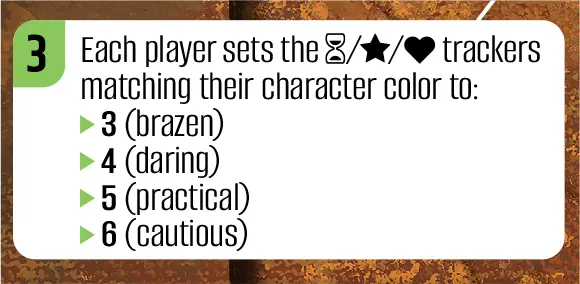 These settings are found on location 000 and on the escape pod locations. Make bold choices while playing, as the first time a player’s time, morale, or health is reduced to 0 doesn’t necessarily end the game—you will have an option to continue playing as presented by the mission’s entry in the take storybook.
These settings are found on location 000 and on the escape pod locations. Make bold choices while playing, as the first time a player’s time, morale, or health is reduced to 0 doesn’t necessarily end the game—you will have an option to continue playing as presented by the mission’s entry in the take storybook.
Your first game is largely about experimentation as you learn about different actions, consequences, and risk tolerances in Vantage. This is more important than the mission; instead, just try to fill your grid by gaining 8 cards from different locations (and from actions on cards in your grid). It’s perfectly normal if you don’t achieve this goal. If you'd like some direction or want to speed up the game, you can perform the actions printed on the mission card.
Discovery and perception are significant elements of Vantage. You will wonder how to do and find things—that is a normal part of the discovery curve of this game, and the game will not hold your hand. Just try things that intrigue you. Use your eyes and intuition: If an action looks difficult, it probably has a high cost. Some actions will turn out differently or be more difficult than what you expect; this will help the next time a player sees that type of action. When in doubt about a rule, apply the Universal Rule of Thematic Fun in the moment (then ask about it later).
Communication between players is critically important, and not just for sharing skills and impact dice slots (which represent sharing your advice and expertise). Each player’s choices are their own, but any information you have from what you have seen and experienced is yours to share freely. To succeed, you will often need to describe what you see and discuss your options, both for short term and long-term goals.
Flora
The world is flush with a variety of flora, each of which has a challenge dice slot for interactions with a specific element. Boost on flora cards represents your understanding of the flora’s nature, which you can learn about by consuming a piece.
Gameplay Overview
The game consists of players taking turns clockwise around the table. Each player performs 1 action per turn (unless indicated otherwise), using skills contributed by any player to decrease the action cost; rolling challenge dice based on that cost to determine any complications encountered; and placing dice on cards in grids to mitigate those complications. You always succeed when performing an action; the challenge is to avoid losing time, morale, and health.
You will typically begin the game by exploring the area where you arrive—which will be different than the other players—and interacting with various locations in the hopes of adding cards to your 3x3 grid; these cards offer additional challenge dice placement slots and other powers. One or more players may pursue the shared mission (why you traveled to this planet), and along the way you may discover various destinies (options for resolving your fate on or beyond this world). You must discover destiny cards—there is no destiny revealed during setup. Work together to share knowledge, skills, and impact dice slots as you seek to avoid any player’s time, morale, or health being reduced to 0.
Solo Play
Solo play in Vantage is the same as any other player count (the number of challenge dice scales as normal, with 10 total dice in a solo game). There is no Automa to represent the other characters—you are in full control. No matter the player count, you only ever control 1 character (we highly discourage you from breaking the immersion by playing multiple characters).
Goals
In addition to anything players deem important to accomplish, there are four types of goals found in Vantage. These include both short-term and long-term ambitions.
Missions
Players share 1 mission each game—this is the reason you traveled to the uncharted planet. Some missions scale by player count (e.g., “plus X per player”); this number simply adds to the total—it is not a requirement for each player to achieve. If you struggle with a mission, there are actions on each mission card to nudge you in the right direction or even to make the mission easier. When you complete a mission, you have the option of ending the game. Actions on mission cards cannot be performed after the mission is complete.
Destinies
You did not expect to crash on this planet, but now that you have, it is up to you to decide your final destination. Players may discover and pursue multiple destinies each game. There’s one destiny that scales by player count (“plus 1 per player”); this number simply adds to the total—it is not a requirement for each player to achieve. Completing a destiny will end the game, so you may wait until you are ready to read the destiny’s entry in the Book of Secrets.
Objectives
You may discover that your character has a personal journey to pursue, leading to a sequence of several connected objectives. When you gain an objective, add it horizontally to your supply. You may not yet place challenge dice on the objective (if it has dice slots), as the card is not in your grid. If you complete the objective, the instructions will tell you to rotate the objective vertically and place it in your grid.
Quests
When you gain a quest (typically by offering to help a sentient), add it horizontally to your supply. You may not yet place challenge dice on the quest, as the card is not in your grid. If you complete the quest, the instructions will tell you to rotate the quest vertically and place it in your grid (after which you cannot perform actions on the quest portion of the card).
When you gain a quest, you will often receive instructions to head in a specific direction. Please treat these directions similar to how you might in the real world–if someone says to head north, they mean “the area to the north”, not an unwavering path straight to the north.
Card Grid
Whenever you gain a vertical card (same size as your character card), place it in any open space in your 3x3 grid: a tableau of up to 9 cards with your character in the middle. You may not reposition cards in your grid. The first time a player completes their grid, place destiny 1705 in the center.
Other than impact slots/powers, any benefits provided by cards in your grid only apply to cards in your grid (not cards controlled by other players or in your reserve).
Whenever you are instructed to replace or lose a card in your grid, refresh any dice on it and return any boost on it to the general supply. Return lost cards to the box. You must always have your character card in your grid. Insert the new card in the same position as the replaced card.
Adjacency in Vantage always refers to orthogonal adjacency (cards that touch at edges left-to-right or top-to-bottom).
Reserve
You also have a limited capacity to reserve vertical cards outside of your grid in your supply (capacity is the total of all icons on cards in your grid). Whenever you gain a card but your grid is already full, you may either reserve the new card or reserve a card in your grid (other than your character card) to make space. Then, if this exceeds your reserve capacity, lose an excess card from your reserve.
You may not use slots, abilities, or powers on reserved cards, but they retain boost tokens. When reserved, a card’s challenge dice are refreshed.
Each character has a boost power to transfer a reserved card into their grid (to an open space or swapping with a card); do not gain “when placed” benefits of cards transferred from reserve.
Supply
Some cards you gain are horizontal, not vertical. These cards are either shared with all players (missions and destinies) or are kept in your supply. There is no limit to how many horizontal cards you can have in your supply. You may not place challenge dice on horizontal cards in your supply.
Icons
Interactions
Some actions specify that they can only be performed when “interacting with a sentient.” For purposes of those actions, you are interacting with a sentient either when you perform a location action where there is a sentient (depicted both in the art and by a composition icon) or when you perform an action printed on a sentient card in your grid.
Items
There are a wide variety of items in the world; some that may need further explanations are listed below.
Artifacts
Artifacts are powerful items earned by completing puzzles. When you first place an artifact, gain 1 boost on it (up to 3) for each card matching its composition in your grid (including itself, so it will always gain at least 1 boost this way).
Books
Books offer knowledge to share with all players, though only you can view a particular page of the Book of Vantages when you use the book card’s boost power. Each book offers information about the world (and sometimes special actions).
Bows and arrows
These weapons have abilities that trigger before you perform an overpower action (step 3). At that time, if you spend a boost from a bow (or from an arrow if you also have a bow), reduce the action cost by 1; you may do this multiple times if you have more than 1 boost on a bow/arrow to spend. If you used a boost from an arrow, also gain the special benefit unique to that arrow.
Emblems
Emblems are powerful items earned by completing trials. They cannot hold boost, but they add boost to each card in your grid that matches its composition. Emblems indicate that a certain type of sentient has welcomed your people into their culture, hence they benefit your entire crew (via impact challenge dice slots).
Maps
When you place a map in your grid, gain 1 boost on the map for each card adjacent to it (sharing an edge). Maps show approximate locations of specific targets in the world, though they are not always comprehensive. By spending a boost, you can view a large version of the map in the Book of Vantages.
Shields
Shields prevent a loss of health upon arriving at dangerous locations. This does not include climate-based damage—it only applies to “upon arrival” penalties that specifically show the health icon ().
Lessons
There are 3 types of magic in this world, and the most common way to gain access to magical spells is through lesson cards. Each lesson card has a look-LEARN action with a cost of (you choose a number 1–6). The more dice you roll, the greater the chance you will roll a challenge die result that you can place on the slot at the top of the lesson card to gain a specific spell card (you can use this slot for any look-LEARN action). Even if you do not roll the matching icon, a lesson’s LEARN action (until level 5) unlocks the next level lesson in that school of magic.
Location Cards
Your location card represents your current position on the planet, and it includes what you can see and many of your action options. Keep it in your location card holder.
Specific numbers in the descriptions below are examples referring to the sample location below.
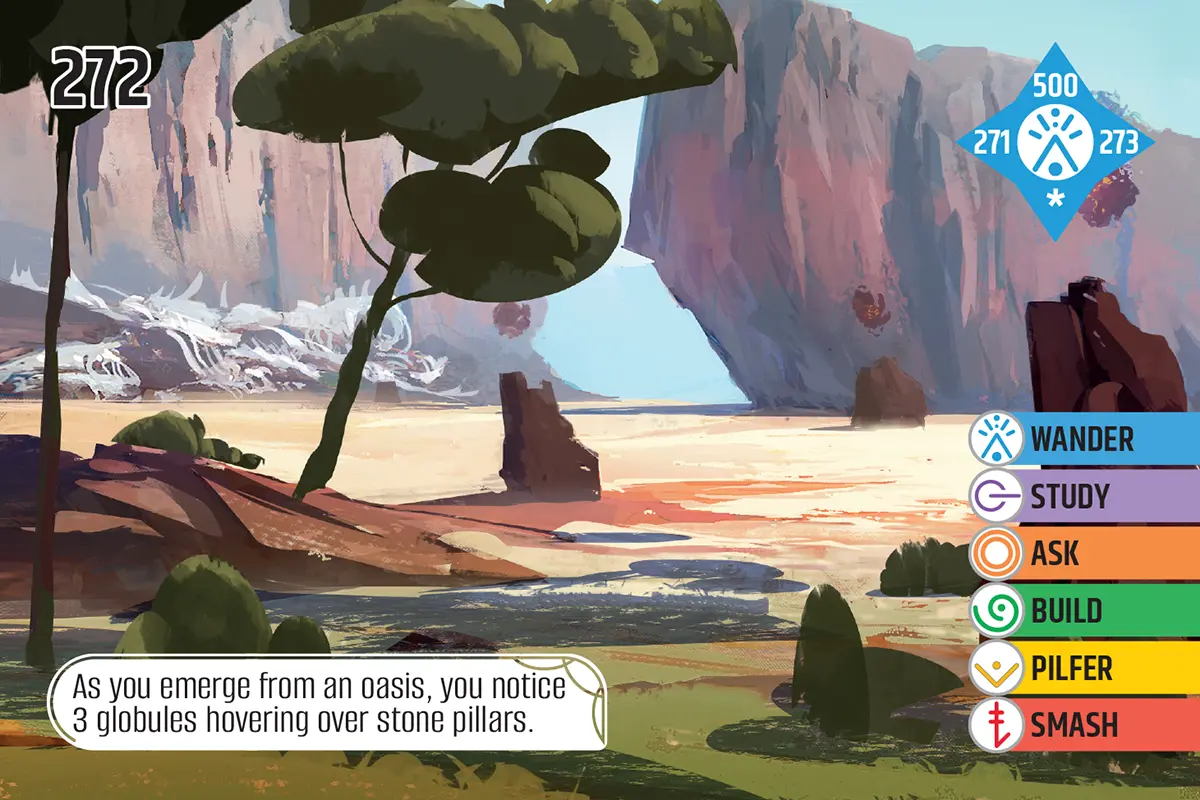
Art (background): This is your vantage. You may describe this view to the other players but not show it to them, as they are elsewhere on the planet and can’t see through your eyes.
Location number (upper left): Provide this number to the other players when you interact with this location so they can find the corresponding entry (272) in a storybook.
-
Compass (upper right): This symbol shows the 4 different cardinal directions to which you can depart from this location (forward is always north). The compass may include:
Adjacent listed locations (e.g., 500, 273, and 271): Departing to any of these locations is a 1-cost move action without a storybook entry.
Unlisted adjacent locations: After choosing to depart in the direction of a * location, the cost is revealed in the Depart storybook for this location number (e.g., 272 move south).
Blocked locations: If there is no number or *, you cannot depart from this location in that direction.
-
Description: Brief text about the location. You may read this to other players.
Some locations show the icon in the bottom left, followed by text in quotation marks. This means that the mysterious Traveler is talking to you at this location.
A icon indicates a mandatory instruction that must be followed immediately upon arrival (typically a climate-related penalty).
Elemental icons (e.g.,
 ) indicate an interaction with something of that composition.
) indicate an interaction with something of that composition.
Location Actions (almost always the right sidebar): You may read these to other players. These are the different ways you can interact with the location within the categories of move , look , engage , help , take , and overpower (e.g., look-STUDY). Unless an action result indicates otherwise, you may only perform 1 location action per location.
Location card holders

Since your location represents your vantage (what you can see), only you may look at your current location card. Place it in a location card holder to keep it upright and easily visible—angled so other players can’t see it.
Obstacles
The description of some actions include variations on the conditional statement “if the ____ is no longer an obstacle, reduce this cost to 1”, typically in regards to moving north past a creature in your way. Apply this at your discretion using the Universal Rule of Thematic Fun. For example, if you talked to a sentient at a location, you may not sneak past them using a “SNEAK past the sentient” action since they already know you’re there.
Orbs
The world contains a number of large glass orbs that act as wayfinders for travelers. Vantage is not an app-driven game, but one type of orb interaction involves going to a website to view and post hints to other players around the world about the surrounding area. It will not work if you enter a location without an orb. This feature was inspired by Elden Ring; thanks to Jose Manuel López-Cepero for creating the website (orb.stonemaiergames.com). The website is not necessary to play Vantage, as there is nothing gameplay related gained or lost in the app.
Penalties
Turn step 6: Suffer penalties from rolled-but-unplaced challenge dice
Resolve dice that couldn’t be placed in card slots, then discard them to the penalty section of the center.
// These symbols represent the loss of time, morale, and health respectively. If you can’t place these dice on cards, discard them to the penalty section of the center, and lose the time, morale, and/or health shown on those dice by adjusting the appropriate tracker. These losses are applied simultaneously. If any of these stats is ever reduced to 0, read the mission’s entry in the take storybook.
This symbol represents a setback. If you don’t place dice with this symbol, return them to the challenge dice pool (this delays the potential for a full refresh, when all dice are returned to the pool from cards in grids and the penalty section).
This symbol represents a blank result (this is good). Discard this die to the penalty section of the center.
Puzzles
To earn many of the world’s artifacts and emblems, you must solve a specific puzzle. You are ultimately responsible for declaring the solution to the puzzle, but other players may see the puzzle if you ask for their assistance. A few puzzles require tokens of different colors, for which we recommend using skill tokens. If you ever encounter a puzzle and would like an alternative way to earn the benefit, perform a matching 9-cost action instead (e.g., look-9-SOLVE).
Thanks to Juliana Moreno and Ariel Rubin (The Wild Optimists) for designing many of these puzzles!
Friendly Reminders
You may always talk openly with other players and share the text of any card, but you may never show your location to anyone else (unless a card specifically says to do so), nor may you look at any location you are not currently on.
When you depart to an adjacent listed location, it is a move action with a cost of 1. Proceed with all steps to complete a 1-cost move action; just like any action, this movement is your entire turn.
When placing challenge dice, unless specified by a challenge dice slot, you can even place blank and setback results. For example, if you roll 1 challenge die to move to an adjacent listed location and the result is blank, you could place it on a general move slot on a card in your grid (to gain a boost bonus), even though there is no penalty for not placing it.
Instead of choosing a location action on your turn, you may perform an action on a card in your grid, your supply, or the center. If you do, view the entry for that action using the number at the bottom of the card.
To use a card’s boost power, spend boost from that specific card. If you gain a boost from a location action, place it on your character.
You can only perform 1 location action per location per game unless an action instructs you otherwise, or if the card specifies that the second action you take is always available (e.g., you cannot perform the take action on a location and then later perform the overpower action there). Other than this restriction, you have complete freedom to choose your actions.
You cannot read the cost or results of an action before performing it. Likewise, some action results include more choices; you can read the choices while selecting, but not the results.
The only “persistent” element in Vantage from game to game is information. Everything you learn about the world can benefit you in future games, and we encourage players to use that knowledge to their advantage. Please respect other players’ desire to avoid or learn what you already know.
For a comprehensive list of ways to make Vantage easier or harder, see “Difficulty” on page 11 of the Book of Secrets.
Resources
Watch it Played rules video.
How to Teach Vantage video from the designer, Jamey Stegmaier.
Join the discussion about Vantage via the Facebook Group or on Board Game Geek.
The Vantage section on the Stonemaier Games website has an overview of the game, news updates, and links to even more resources.
Action Results
Turn step 7: Read the action result
Most actions result in an immediate benefit described in the storybook (or on the card for some card actions).

In multi-option lists, make a choice before learning or viewing the outcome (e.g., if you choose to move to location 259, you only look at that card after making the decision).
If your location changes as a result, the player in charge of managing the cards will use your placeholder card to return your current location card to the box, find and give you the new card, and mark the new card’s position. In the rare case that you move onto a location on either side of someone else’s location card, simply pass it back and forth.
If a location’s (upon arrival) effect—or any other penalty—instructs you to suffer 1 heat, cold, or hypoxia damage, lose your choice of either 1 or both 1 and 1 .
If you would ever gain // when that stat is already at the max of 6, instead gain 1 random skill (roll a skill die and gain a skill token matching the result).
-
Skills
If the results include a skill payment (e.g., pay 1 move or 1 overpower), any player may discard a skill token so that you can gain the benefit. If no one pays, you do not gain the benefit.
If the results include a skill benefit (e.g., gain 1 move or 1 engage), gain a skill token of that kind.
If the results instruct you to gain a random skill, roll a skill die to determine the token to gain. Sometimes the benefit is a specific skill (e.g., “Roll 2 skill dice and gain all move results”).
-
If another player is on your location, during this step you may:
depart/move them with you (simultaneously, with permission; they don’t pay the cost), and
give them coins, items, flora, and vehicles (ignore “when placed” effects on exchanged cards; the exchanged cards retain all challenge dice but lose all boost).
If an action result or any consequence causes you to lose something that you don’t have (e.g., lose when you have no money, lose a card in reserve when you have no cards in reserve, etc.), ignore those instructions. This rule only applies to results, not costs—if you can’t pay a listed cost, you may not gain the benefit.
If you would ever gain a card you already have in your grid, instead gain 1 boost on the card (if possible).
If you would ever gain a card another player already has, the two players decide who keeps/gains it. If the card goes to you, any challenge dice on the card are refreshed and any boost are lost, and you gain “when placed” benefits on the card, if any. If the card remains with the other player, you instead gain 1 boost on your character (if possible).
Runes
There are runes found throughout the world that match the icons of the 6 skills, and some actions will ask you to look for specific runes on your current location. The color of the runes is not important (some are well hidden as a result) nor is their mirroring; only the shape matters.
-
Move
-
Look
-
Engage
-
Help
-
Take
-
Overpower
Sample Turn
This is a brief overview of a sample turn, and each of the steps described here are explained in detail elsewhere.
Choose one action from the three types of actions: I’m at location 272, and decide to perform a location action. I read my location’s description aloud and describe what I see. The area does not look dangerous, so I commit to performing the move-WANDER action (I cannot change my mind after proceeding to the next step).
Read the cost and action (not the result): Another player finds entry 272 in the move storybook and reads the cost (3) and the action (“WANDER around the mysterious area”). They do not read the action result.
Reduce the cost by 1 per matching skill optionally paid by any player: I do not have a move skill token, but another player does. They discard 1 move skill token to reduce the cost by 1.
Roll dice from the challenge dice pool equal to the remaining cost: I roll 2 challenge dice, resulting in 1 time and 1 health I have to deal with (thematically, the action took more time than expected and I hurt myself doing it).
Place rolled challenge dice one at a time on grid cards (any slots on your cards and impact slots on other players’ cards): My character, the captain, has both challenge dice slots open. I am performing a move action, so I can place any die on the move slot—I choose the time die for this—and gain 1 boost as the immediate output, placing a cube on my character. I only have my character card in my grid and no other player has an open impact slot for health results, so I cannot place the health result.
Suffer penalties from rolled-but-unplaced challenge dice: The unplaced die showing health goes to the penalty section of the center and I lose 1 health (adjusting my tracker). The time die remains on the character card.
Read the action result: Another player reads the result for entry 272 in the move storybook.
End your turn: The action result did not say “continue,” so my turn ends here. If the action had said to “continue,” I’d be required to perform another action; if it had said, “You may continue,” it’s my choice to perform another action or not. This only applies to my current turn; I may not continue at this location on a future turn unless another action allows me to do so. The player to my left takes the next turn.
Seeds and Trees
Seeds are grid cards, though you cannot gain boost on them until you choose a specific location where they will grow (a location you are on). From then on, it is a matter of time until the seed grows into a tree. Trees are horizontal cards kept in your supply on the location where they were grown. To remember a tree’s location, place the tree card on top of its location card (we recommend leaving this location on the table rather than returning it to the box when a player departs).
Sentients
The world of Vantage is populated by a diverse array of sentients (the people of this world). Sometimes you will see them and interact with them, but they’re also actively walking around and living their lives—they’re all around you. Many people on this planet will join you for a limited time, with the temporary nature of their companionship indicated by the number of boost on the sentient card (if a sentient ever has 0 boost, lose them at the end of the action unless they regain boost during the action). Each sentient has a challenge dice slot that costs a boost (from the sentient) to use, a challenge dice slot related to an ability in which they are an expert, and an impact challenge dice slot to be used in interactions with anything sharing the same composition (including the actions printed on the sentient itself). Unless an action states otherwise, there is no limit to the number of times you can perform each action on the sentient.
Setup
Place the game box on the table next to a player in charge of finding and returning cards (they gain placeholder cards 1709–1714); this is more efficient than passing the box around the table. Tilt the three big stacks of large cards out of their flat-packed position.
Place the board (the “center”) in the middle of the table with time, morale, and health trackers nearby. Both sides of the board are functionally the same.
Place all skill tokens, coins, boost tokens (cubes), skill dice, and the storybooks in a general supply near the game board (the “center”). The backs of most storybooks have reference guides.
Seed the challenge dice pool with 8 challenge dice plus 2 per player (e.g., for three players there are 14 dice), then return the remaining challenge dice to the box.
Each player gains a location card holder. Randomly select someone to be the first player.
-
Place the Book of Vantages on the table with the back cover facing up to display location 000. Follow the instructions on location 000 to complete setup, using skill dice for randomization. It is here that each player will independently gain their character and starting stats.
Sharing Information
Since your location represents your vantage (what you can see), only you may look at your current location card.
You may not look at any of your previous locations or the locations seen by other players. You may describe the card’s artwork to other players, read the description aloud to them, and share the location action options.
If you are directed to look at a page in the Book of Vantages, you may look at only that page, and you may not show it to other players.
Tokens, dice, cards in each player’s grid, reserve, and supply, and cards you are instructed to place on the table are public information.
Skill Tokens

Skill tokens are benefits players gain at the beginning of the game and in various ways throughout the game (including when your time /morale /health would increase above 6). They represent bits of knowledge for the various action categories (move/depart, look, engage, help, take, and overpower).
Whenever you have the opportunity to pay a skill, any player can pay it. Skills are often paid to decrease the cost of an action—whether you are performing the action or another player—but some action results also offer the option to pay skills to gain additional benefits, and some “upon arrival” penalties ask you to pay certain skills.

Whenever you gain a “random skill”, roll a skill die and gain a skill token matching the result.
Skills
Turn step 3: Reduce action cost by 1 per matching skill optionally paid by any player
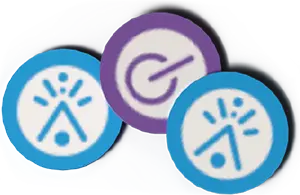
Using skill tokens to reduce the cost will decrease the potential to lose time, morale, and health due to unplaced challenge dice.
Skills (tokens) represent insights and advice.
Players may pay skills to benefit each other at any time, not just to reduce action costs.
Discard paid skill tokens to the general supply. You are limited to the tokens provided.
Skirm
Skirm is a card and dice dueling game played by many sentients of the world. Instructions for how to play Skirm are found on card 798, and there are 12 default Skirm cards used by sentients (and you, if you have not earned a card from the spoiler pack). The design of the spoiler pack is to make it authentic to this fictional planet. All Skirm cards you collect in a Vantage session take up 1 total reserve capacity (they cannot be placed in your grid); return all non-default Skirm cards to the spoiler pack at end of game.
Skirm: Quick Variant
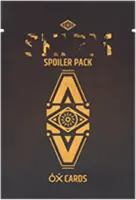
Setup
- Ignore card 798.
- If this is your first Skirm duel, gain destiny 1603.
- From the spoiler pack, gain 1 random card.
Roll skill dice

- Roll 6 skill dice for yourself.
- Roll 6 skill dice for the sentient.
Choose cards
- Choose 1 of your Skirm cards to play for yourself.
- Choose 1 random Skirm card from the pack for the sentient (or a specific card if indicated in the action).
Resolution
- You are trying to have more dice matching the icons on your card versus the opponent’s dice matching the icons on their card (ignore all text).
- If your card has the higher speed (upper left number), you may reroll all your dice once.
- If your card has the lower speed, you break ties when comparing the dice.
Outcome
- If you win: Gain $2.
- Win, lose, or tie: Keep the card you gained in your reserve (your entire Skirm collection counts as only 1 reserved card).
Card Slots
Turn step 5: Place rolled challenge dice one at a time on your grid cards (and impact slots on any players’ grid cards)
By placing a die on an open slot, you avoid suffering its penalty.
-
Each slot can hold at most 1 die. Most slots have restrictions on which types of challenge dice can be placed. Click on the examples below to see more details.
Skill type (e.g., you may only place a challenge die here during a move () action).
Ability (e.g., you may only place a challenge die here during a help-CREATE action). Important: If you have dice slots or powers related to abilities, pay close attention when moving to a new location, especially if someone else is reading the storybook to you.
Interaction (e.g., you may only place a challenge die on this slot during an action involving a sinew (
 ) creature. This includes location actions and card actions showing this icon, plus interactive depart actions (e.g., “Sneak past the creature”).
) creature. This includes location actions and card actions showing this icon, plus interactive depart actions (e.g., “Sneak past the creature”).Many slots have a , , , or , indicating that only a die showing that specific result may be placed there. For any slot without a specific die face, any result may be placed (even ).
Impact dice slots may be used by any player (with your permission), even if they are at a different location. They represent expertise and personality (e.g., a character with a morale impact slot is someone with a positive attitude and leadership qualities). If another player places a challenge die on your impact dice slot and there is a bonus (e.g., a boost), you gain it.
To place a challenge die on a terrain-specific dice slot (e.g., underwater, identified visually from the art), your current location must match that terrain.
Some slots have costs to place a challenge die (arrow pointing towards the slot; you must pay the boost (1 or 2, as indicated) from the same card).
Some slots provide immediate bonuses when you place a challenge die on them (arrow pointing away from the slot; place the gained boost on the same card). While the bonus is typically a boost, other bonuses are also possible (a skill, //, a specific card, etc).
If another player is at your location, you may place challenge dice on open slots on their cards (even non-impact slots) with their permission.
If another player has a location-specific card in their supply and you are on that card’s location, you may perform actions on that card.
Whenever a challenge die is placed on a slot, it remains there until all challenge dice are refreshed.
Spells
When you place a spell in your grid, gain a boost on each card in the column of the spell (including the spell card itself). Most spells have an impact challenge dice slot and a powerful impact boost power.
Spoilers
Like the glossary in the Book of Secrets, this resource includes entries for many terms you may discover while playing Vantage. We highly recommend only reading a “spoiler” entry if you have questions, and only after encountering a specific type of card or a specific term. For example, the first time you see a Lesson card, you may look up “Lessons”.
Spoiler entries can be found in the Index & Search. You can also choose to include them on the main screen in settings.
Spoiler pack of cards

Will you earn the contents of this mysterious pack of cards as you explore the planet? Follow your boldest gaming instincts to find out!
Storybook Lookup
- 1
- 2
- 3
- 4
- 5
- 6
- 7
- 8
- 9
- ⌫
- 0
- ✓
Storybooks
On most turns in the game, short passages of text in a storybook are referenced: Early in your turn you will read the cost and the action (in bold), then later in your turn you will read the result (unbold text). We recommend that players share the responsibility of reading aloud, with another player reading on your turn so you can focus on the mechanisms of performing an action.

There are 9 books: 1 storybook for each of the skills, 1 for depart actions, the Book of Secrets, and the Book of Vantages. The reason for separate storybooks (instead of one giant book) is to help players avoid spoiling other actions on the same location, as each action has different costs and results. Separate storybooks also discourage players from making a choice and then changing it after seeing the other options (which is against the rules and the spirit of the game—you will need to use your eyes and the shared knowledge of all players to intuit the nature and difficulty of an action before performing it).
Structures
Structures are horizontal cards kept in your supply. You (any player, not just the player who created the structure) may only perform actions on the structure when you are on its location of origin, which you can remember by placing the structure card on top of its location card (we recommend leaving this location on the table rather than returning it to the box when a player departs). Unless an action states otherwise, there is no limit to the number of times you can perform each structure action.
Terrain
There are various types of locations in Vantage, the default of which is a “land” location (outside on the surface of the planet). Some cards may refer to a specific terrain.
Cities
City locations are vertical cards labeled with the name of the city (or town, village, etc—they're all cities. The various horizontal locations in the capital are not city locations).
Within each city are a variety of businesses you can explore, each tagged with action icons (these do not count as “runes” for other actions); you will need to intuit the nature of each business from the art and other context clues.
Each city location includes special instructions on the card: "You may perform multiple different actions here (1/turn)." This is an exception to the typical rule of one total location action per location. Please note the word “different”—you may not choose the same action twice.
Interiors
If you gain access to the interior of a building, you have limited time to interact with the location before you must leave. Different features within the interior are tagged with action icons (these do not count as “runes” for other actions), allowing you to focus on the item that catches your eye. When you exit an interior, you will frequently find yourself back on on the previous location (e.g., you’ll go from location 123 to interior 550 and back to location 123), so for ease of play you can set the location temporarily off to the side while you’re inside.
Ocean
The surface of the ocean is an ever-changing landscape—you are at the whim of the tides. You may repeat actions on ocean locations (i.e., you may perform a location action on an ocean location even if you have already performed a location action at that location on a previous turn). Ocean locations also offer the option of diving underwater; if you originally surfaced from an underwater location, the currents may have shifted your location. There are no preset adjacent ocean locations to which you can move.
Sky
There are a few vehicles and items that allow you to fly above the planet (referencing your current region, found in the look storybook, and the Book of Vantages), enjoying a bird’s-eye view of the land below. Thematically, you cannot use these vehicles and items if you are not outside. Given the thin atmosphere, you suffer 1 hypoxia damage whenever you arrive at a sky location. When you are on a sky location, you can fly in each cardinal direction or you can steer back down to the planet, either aiming roughly at one of the quadrants on the sky location or—if your previous action was to fly up to the sky location—landing back on your previous location. You may perform the same move-STEER action on the same sky location on different turns if you find yourself there again.
Underground (Cavern Barriers, Caves, & Dungeons)
Cavern Barriers
These underground entrances to caves present a barrier in your path. There are 6 different types of cavern barriers, each with a different action associated with proceeding deeper. If you find yourself on the same cavern barrier location multiple times in the same game, you are always allowed to perform the action required to proceed deeper (whether or not you have previously performed it).
Caves
These underground locations have the standard 6 location action choices and a way to travel deeper into the planet.
Dungeons
Dungeons are underground locations that connect to several caves. Each dungeon presents an obstacle to overcome, some of which strike first when you arrive. Dungeons offer the option to exit to the location from which you originally entered the dungeon (even if you have since traversed through several dungeon locations). You may repeat actions on dungeon locations (i.e., you may perform a location action in a dungeon even if you took a location action there on a previous turn).
Underwater
There are some underwater locations where, due to the lack of oxygen, you suffer 1 hypoxia damage whenever you arrive. The cost to depart to an adjacent listed location while you are underwater is move--SWIM (just like walking to an adjacent listed location on land). Most underwater locations include an always-available move-SURFACE action if you need to catch your breath.
Water
There are many locations that feature streams, rivers, ponds, lakes, and oceans. Some cards have special benefits if you are “on water” or if there is water nearby. There is no symbol to indicate this on locations; it’s simply a matter of whether or not you can see a body of water on your current location. If you are underwater or in the sky, you are not “on water.”
Tokens

Vantage includes boost tokens (cubes) and skill tokens (cardboard). Cubes are sometimes used as counters other than boost (e.g., on goal cards) or as defined on certain puzzles.
Trackers
Use these to track your character’s time , morale , and health on the center gameboard.
If any player’s , , is reduced to 0, read the mission’s entry in the take storybook.
- If you would increase , , or above 6, instead gain 1 random skill.
Traveler
The mysterious Traveler sent the signal that brought you to this planet. The Traveler appears on many locations, indicated by a specific icon and text between quotation marks (they are talking to you).
Trials
Each of the world’s cultures has an initiation trial for their people and anyone who wants to be welcomed among them. Each trial location has a specific action—an important action to its corresponding sentients—that you may perform after you have been formally welcomed to participate in the trial via one of the other actions. The trials themselves are puzzles that a player may attempt once per game. If a player fails at a trial, another player can try it later in the same game.
Turns
- Choose one action.
- Read the cost and action (not the result).
- Reduce the cost by 1 per matching skill optionally paid by any player.
- Roll dice from the challenge pool equal to the remaining cost.
- Place rolled dice on slots in your card grid (& slots in any grid).
- Suffer penalties from rolled-but-unplaced challenge dice.
- Read the action result.
- Did the result say to “continue”?
Universal Rule of Thematic Fun
If you are ever in doubt about a Vantage rule, card, ability, or anything else, choose the most fun answer that makes sense thematically.
We are always happy to help in real time or after your game if you post your question (aided by details about the situation, including exact text, when available) in the Vantage Facebook group, on BoardGameGeek, on the Vantage FAQ page on our website, or on the Stonemaier Games Discord server.
Vehicles
Vehicle cards assist you with travel. Some vehicles have special benefits related to a location’s terrain. Many vehicles have move-RIDE actions that instruct you to use a guide in the Book of Vantages to find a specific location card. Almost all vehicles feature a help-UPGRADE action (requiring a boost from the current vehicle) to replace it with a better vehicle.

 Challenge dice
Challenge dice Coins
Coins